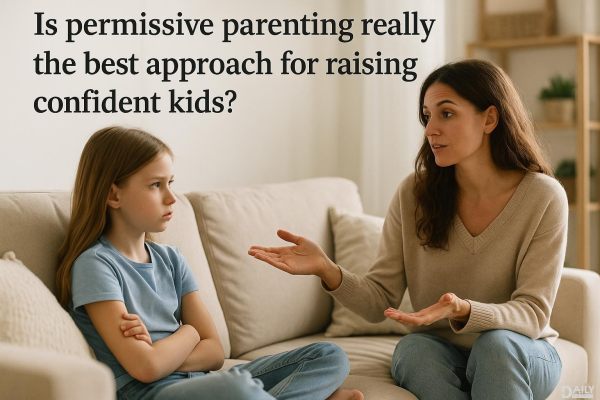Permissive parenting, often characterized by a laid-back, indulgent approach, is not necessarily the best method for raising confident kids. While it may seem like giving children more freedom fosters independence, this style often lacks the structure and boundaries that kids need to thrive. Confidence comes from a balance of support, guidance, and clear expectations—something permissive parenting often misses the mark on.

Permissive parenting is all about being the "cool parent." You know, the one who lets their kid stay up late, skip homework, and eat dessert before dinner. Sounds fun, right? But here’s the kicker: kids actually need boundaries to feel secure. Without rules, they can feel lost or unsure about what’s expected of them. Imagine driving a car without any traffic lights or signs—chaos, right? That’s what it’s like for kids growing up without structure. They might seem confident on the surface, but deep down, they’re often anxious or unsure how to navigate challenges.
Here’s the deal: boundaries aren’t about being a control freak. They’re about giving kids a framework to understand the world. When parents set clear expectations, kids learn what’s acceptable and what’s not. This helps them develop self-discipline and problem-solving skills, which are key ingredients for confidence. For example, if a child knows they have to finish their homework before playing video games, they learn to manage their time and prioritize tasks. These small wins add up, helping them feel capable and self-assured.
Permissive parents often pride themselves on being emotionally available, and that’s great—kids need love and understanding. But emotional support alone isn’t enough. Kids also need guidance on how to handle their feelings and navigate social situations. For instance, if a child is upset because they didn’t get their way, a permissive parent might just let it slide. But a more balanced approach would involve helping the child process their emotions and learn how to cope with disappointment. This teaches resilience, a cornerstone of confidence.
One of the biggest pitfalls of permissive parenting is the lack of accountability. When kids aren’t held responsible for their actions, they miss out on valuable life lessons. For example, if a child breaks a toy and there are no consequences, they don’t learn about responsibility or the importance of taking care of their belongings. On the flip side, when parents enforce rules and consequences, kids learn that their actions have an impact. This sense of accountability helps them develop a strong moral compass and the confidence to make good choices.
So, if permissive parenting isn’t the answer, what is? Enter authoritative parenting, the Goldilocks of parenting styles—not too strict, not too lenient, just right. Authoritative parents set clear rules and expectations but also provide warmth and support. They encourage independence while offering guidance when needed. This balance helps kids feel secure and confident in their abilities. For example, an authoritative parent might let their child choose their own extracurricular activities but also set limits on screen time. This approach fosters autonomy while ensuring kids stay on track.
If you’ve been leaning toward permissive parenting, don’t sweat it—it’s never too late to make a change. Start by setting clear, age-appropriate rules and consistently enforcing them. Be sure to explain the reasoning behind the rules so your child understands why they’re important. At the same time, stay emotionally available and open to communication. Encourage your child to express their feelings and opinions, but also guide them in making responsible decisions. It’s all about finding that sweet spot between freedom and structure.
At the end of the day, raising confident kids isn’t about being the "cool parent" or the strict one. It’s about providing a balanced environment where kids feel supported, guided, and empowered to grow. So, while permissive parenting might seem like the easy route, it’s worth putting in the effort to create a more structured, nurturing approach. Your kids will thank you—and so will their future selves.
























